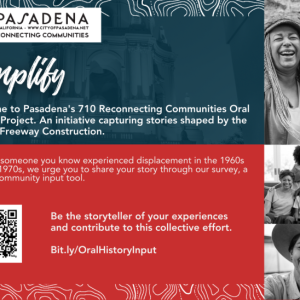 View Winners →
View Winners → ‘A Raisin in the Sun’ at A Noise Within Portrays the American Dream
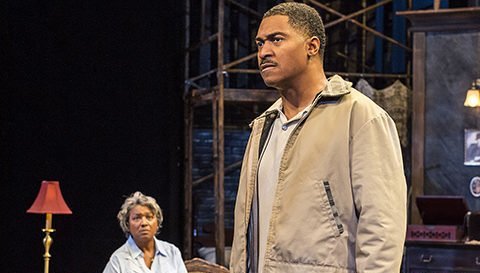
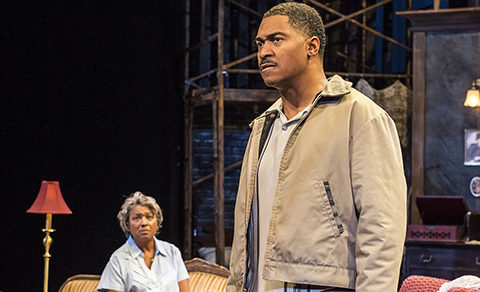
Saundra McClain and Ben Cain. Photo by Craig Schwartz
By May S. Ruiz
It is an American dream – to get an education, earn a fair wage, own a home, and live a life of dignity. In this land of opportunity that seems attainable. There are people, however, to whom the realization of that dream is elusive.
This is the theme of Lorraine Hansberry’s seminal play ‘A Raisin in the Sun,’ which debuted on Broadway in 1959. The title is derived from a line in ‘Harlem,’ a poem by Langston Hughes, ‘What happens to a dream deferred? Does it dry up like a raisin in the sun?’
There has been a renewed interest in ‘A Raisin in the Sun’ of late. According to American Theatre magazine, it is one of the ten most produced plays of the current season. And it is on stage at A Noise Within from February 25 to April 8, 2018 in repertory with Henry V. Directed by accomplished actor and director Gregg T. Daniel, its cast includes Saundra McClain as the matriarch of the Younger family; with Ben Cain as Walter Lee, Toya Turner as Ruth, Sarah Hollis as Beneatha, and Sam Christian as Travis.
On a recent afternoon, Daniel and McClain sat down to share their thoughts about the play, what it means to be a person of color in today’s political climate, and what they hope they are able to convey to their audience.
Neither Daniel nor McClain has staged it before but both are familiar with ‘A Raisin in the Sun.’ Says Daniel, “This play came out around the time of the Civil Rights Movement. It was very significant in that it was the first play written by an African American woman staged on Broadway and which was later adapted into a movie.”
Adds McClain, “My generation grew up with this play – in college the first monologue I learned was from it. More recently, I was involved in the stage reading of ‘A Raisin in the Sun’ here. It was an amazing experience; we got a standing ovation after the show.”
“They got such tremendous response when they did the reading two years ago,” continues Daniel, “which compelled Geoff and Julia to mount a full production. They contacted me because I had just finished directing ‘Le Blanc.’
Lorraine wrote ‘Raisin in the Sun’ in 1959, wherein she portrayed an African-American family with seemingly competing dreams that threaten to tear them apart and what they come up against as they try to better themselves. Everyone reacted to it saying ‘I didn’t know that was happening to black families until I saw it on stage.’ The floodgates opened after that; it altered American theatre forever.
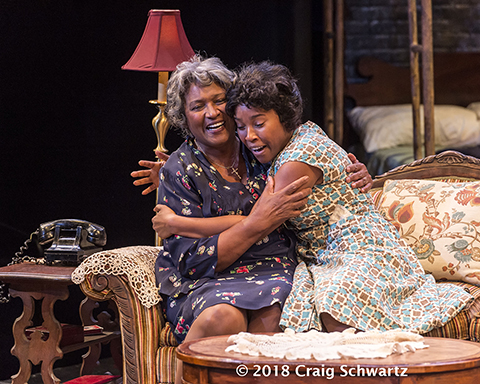
Saundra McClain with Toya Turner. Photo by Craig Schwartz
One thing that’s different about our production is the humor which a lot of people said they didn’t expect to see. The role of Mama has been played as a heavy character – stern, aggressive, and judgmental. That disposition is the very opposite to Saundra’s who has such joie de vivre; she’s so vibrant and alive.
Right at the outset, Saundra was my first choice for the role because as dysfunctional a family as the Younger household is, they love each other. They have moments of cheerfulness and moments of levity, and she could bring all that to this play. Our Mama is very joyful; she has a lot more laughs than has been depicted in previous plays. You could clearly see that she loves Walter; she’s not bullying or bludgeoning.
‘Raisin’ was set in 1959 so it reflected that scary and worrying period in history. But there was no reason for us to do it that way. And we live in interesting times, with #Black Lives Matter and #Oscar So White. We still have racial issues but they’re of our time so we want to be emblematic of our present challenges.
Change is costly – it’s always bloody and violent. It took courageous people like Martin Luther King, Malcom X, and Robert Kennedy to stand up and advocate for change. But lest we forget, we’ve had a black president since then which proves we have evolved in terms of political consciousness.
That said, I feel like we’re reverting to the era of divisiveness with families ripped apart and social support withdrawn. People of conscience should rise up and say, ‘Enough, this isn’t what American is all about!’ There needs to be consequences when you verbalize bigotry and hate.”
McClain opines, “It’s a universal play that speaks not only to African-Americans but to Latinos, Muslims, immigrants, all people of color in our society right now all over the world. There’s a white nationalist sentiment currently going on and it’s a little bit frightening. This small group of people are afraid of the change that’s taking over now, of not being the superior race. But there is no superior race, it’s the human race.
Every day that I’m in this play, I get a better understanding of Mama and her relationship to her children, especially to her son, that I didn’t know before. Mama is uneducated; she is devout about her religion and everything beyond the bible has to be wrong. She is very supportive of her daughter Beneatha who is a little bit like her. But because of all her education, Beneatha turns against God. That is the change I don’t like.
On the other hand, Mama thinks that Walter is irresponsible. He drinks and doesn’t adequately provide for his family. He’s still dependent on Mama so he isn’t his own man. And while he’s so right about so many things he goes about it the wrong way. He doesn’t have the knowledge nor the sophistication to realize his dreams. It’s only at the end of the play that I finally give him respect.
This iteration of ‘Raisin’ gives it a ‘now’ perspective because we’re focusing it on Walter instead of Mama. Young black men today can relate to him – it’s open season for them in our current political climate. During today’s student matinee, some of them didn’t get the references in the first act. But in the second act when I beat up on Walter, you could hear a pin drop. And then there were sniffles in the audience. After the matinee one of the boys came up to me, shook my hand, and said, ‘This reminds me so much of my family. I wish my grandmother had seen this play.’”
Daniel adds, “There are certain cultural themes that they understand. This generation isn’t quite as burdened as we were because, if anything, they have been the outcome of all the civil rights movements. When I was in college there weren’t very many black students. We have come a long way in so many respects.
But, as in times past, it is our country’s youth who will lead the charge for reform. They are vocal about how unfair it is when they’re judged by the way they dress, or how they talk, or for their lack of education. This generation is more aware of social justice and is at the forefront of societal movements. They know what they need to do to achieve quality of life.
This is a very American play. It reflects the dreams of every human being in this nation – Mama wants a house and a garden of her own; Beneatha wishes to become a doctor; Walter aspires to upward mobility. Which one of us wouldn’t understand what they’re reaching for?
We want the audience to see that everyone’s potential deserves to be realized, that if they work on it, they have an equal shot at achieving it without impediment – whether it’s due to racist laws, or their economic stature. We have to appreciate that if we deny one person’s dream because he’s black or he’s gay, that affects us all. That’s a tragedy.”
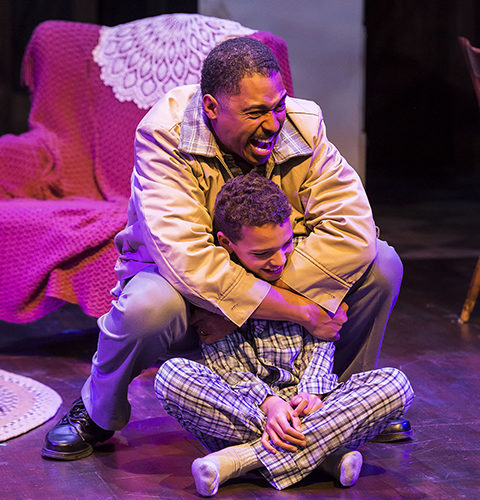
Ben Cain with Sam Christian. Photo by Craig Schwartz
“I wanted to focus on Walter because he has the biggest journey, he goes the farthest,” Daniel expounds. “At the start of the play Walter is a miserable human being. What he wants drives them apart because he’s simplistic, almost like a child with his grand dreams. He’s looking for an easy way out of their situation, to benefit without putting in the work.
In the end Walter realizes that he needs to be the role model for the next generation, for his son. It’s the catalyst that gets him on the road to transformation. He declines the offer from the Clybourne Park Association because he doesn’t want to teach his son that swindlers win. In this golden moment – like the rainbow after the rain – he decides not to lose is soul. His arc is the most transformed. By the time he decides to reject the money, there isn’t a dry eye in the audience.”
Lorraine Hansberry, a woman of color and a playwright ahead of her time, is a visionary unparalleled. Her jewel of a play, ‘A Raisin in the Sun,’ is an uplifting tale of one family’s struggle that ultimately ends triumphantly. It is a hopeful, positive story which shows that individuals, however imperfect and flawed, will find the wisdom to do the right thing for the people they love. It is a revelation to inspire us all.








































































































